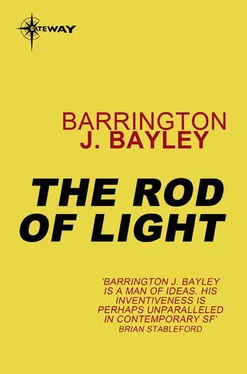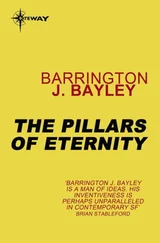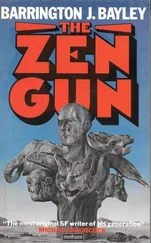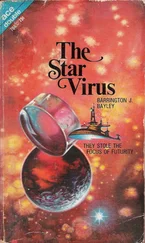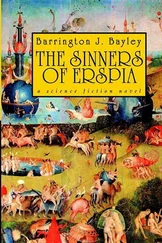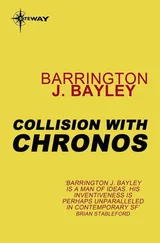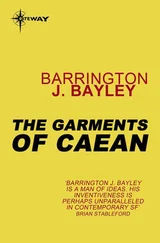A sense of amazement was coming over Jasperodus as he grasped what the man was saying, but again he shook his head. ‘You apparently believe artificial consciousness to be the next step in construct development. I can tell you categorically that artificial consciousness is a scientific impossibility. It has been proved so.’
‘Well, I am no robotician,’ said the templar dreamily, ‘but I have met better minds than mine who believe this “impossibility” could be circumvented. Ahrimanic minds .’ With a sudden, almost aggressive movement the man noisily drained his goblet and banged it down on the table beside him. ‘What of you, for instance? ’ he demanded loudly. ‘We sit here talking of consciousness, and you seem to have no difficulty over the meaning of the word. One might almost think you were conscious. At any rate, it tells me something about you. It tells me that your tale of archaeological work is only a cover. You go to join Gargan, perhaps.’
‘Gargan?’ Jasperodus queried.
‘A construct, like yourself.’ The templar’s eyes began to unfocus and his eyelids to drop. ‘He, too, asked for instruction in the doctrine of Zoroaster. Only he did not pretend to come upon me by accident.’
Jasperodus fell silent. Disconcerting as the templar’s statements were, he was beginning to lose the drift of his meanderings.
‘Looking on robots as you do,’ he remarked, ‘why did you allow me into Ahura Mazda’s temple?’
‘Why not? Ahriman will enter the inner sanctum. Ahriman will seize the sacred flame. For thousands of years the great knowledge has been preserved in secret sects and brotherhoods. Now I am alone—yes, I am the last of the mages; and when I am gone there will be no one to keep the sacred flame. I bear you no malice, robot. You are a creature, and though you are born of the machinations of Ahriman, you cannot help that. The two gods are equal in stature.’
‘You speak, of course, of Ahriman’s victory on the planet Earth,’ Jasperodus said. ‘What of the outcome on a cosmic scale?’
‘Ultimate victory for either side is a distant prospect,’ the mage murmured. ‘It would change the character of nature, bringing the universal drama to an end…’
He swayed in his chair and his head drooped. Throughout his explanations, the blue-gowned Zoroastrian had shown a remarkable ability to seem incoherently drunk one minute and incisively sober the next. Perhaps he had some method of metabolising alcoholic poisons out of his system with unusual rapidity, Jasperodus thought.
But now he seemed spent, and laid his head on the table with a loud sigh, cradling it in his arms. This failed to bring him to rest, however, and his body slid slowly and majestically floorward.
Jasperodus rose, gathered him up and placed the sleeping form on the ottoman. He stood there, reflecting.
The flame. He felt an urge to see the flame again.
Hurriedly he went back down the stone passage to come again to the inner sanctum, and stared spellbound into the luminous fire. The flame’s fan shape, he observed, was due to a slit-like metal burner which emitted the combustible oil in the form of a vapour or spray—the device was more elaborate than the lamp outside the porch. And the symbolism was exquisite! The flame hissed, it roared, it wavered, but it never lost shape. Jasperodus traced the course of a spark as it caught fire an inch from the orifice, a glowing star that danced and soared, soon to be extinguished in the outer darkness.
The Zoroastrian creed, too, was fascinating. Jasperodus was much taken by its description of existence as universal war, a war that was as hazardous as it was unceasing. It differed radically from other mystic doctrines he was familiar with, which generally depicted nature as issuing from some all-embracing principle of unity or harmony—a view, he now recognised, which contradicted the facts, and clothed a core of delusive sentimentality.
Slowly, head bent in thought, he returned to the living chamber. Looking down on the sleeping templar, he debated within himself what he should do.
It had startled him to hear the mage practically—or so it seemed to him—accuse him of being conscious. If so, this aspect of their conversation was much more extraordinary than the Zoroastrian doctrine itself. One would have to believe that the temple keeper could sense another conscious mind directly through the legendary faculty of telepathy, much as some robots were able to commune by brain-to-brain radio.
It was true what Jasperodus had said: consciousness could not be artificially generated. It was immaterial and therefore uncreatable. But on one other point he had, by implication, lied. He himself was what he had denied was possible: a conscious robot.
There was a great secret, of which he was guardian: true, consciousness could not be made; but it was malleable. It could be treated, melted down, ducted into a special retort, transferred from one vessel to another. In that process lay the source of Jasperodus’ being.
Two had been involved in it: the genius who had discovered the principle, and his childless wife. Sad at their childlessness, they had found a new way to satisfy the urge to leave progeny. First, they had constructed Jasperodus’ powerful brain and body, then had come the arcane infusion: each, man and woman, donating half a soul to mix a new, original soul in the metal body; and thereby becoming Jasperodus’ father and mother.
They, too, had used the analogy of fire to describe consciousness, calling it supernal fire, cosmic fire. They were dead now, and with them had died all knowledge of how to work the psychic alchemy. Jasperodus, their son and sole confidant, was sworn—whatever it might cost him in personal loneliness—never to disclose that such a thing was even possible. His father had judged such knowledge too dangerous to mankind.
If he were to suspect now that the templar had divined his secret…
Jasperodus raised his fist. One blow would silence the sleeping man forever.
No, the idea was not plausible. The mage could not have guessed the truth. It was simply that he had fallen into a trap common among those who attached themselves to doctrines: he saw verification of his beliefs in everything that happened. Convinced that robots were on the verge of acquiring consciousness, he imagined it in every robot he met. More than likely he was half-crazed, an embittered hermit faced with the dying-out of his sect.
Jasperodus let fall his hand. By now night would have fallen, and there was nothing to detain him further. Searching the living room he found, behind a wall hanging, a set of levers for operating the porphyry doors. He cleared the corridor and walked through to the open air, where he climbed the wall of the cirque in near-darkness.
A three-quarters moon rode in the sky. The wan wash it cast on the landscape was the ghost of light rather than light itself. The indistinct hills and vales showed dim and silvery, seeming unreal, preternaturally silent, as if they were not seen at all.
The mage had given him a Zoroastrian aphorism: ‘The sun rules the light, the moon rules the dark.’ The dark, if Jasperodus had understood him correctly, was the realm of the robotic mind. Was this glimmering moonlit landscape, then, symbolic of the robot’s world? Seen but not really seen? He had often tried to imagine what genuine construct existence was like. Logically it was not like anything—it was not there at all. Yet it did contain thought; there was deliberation in it, and a machine awareness that was like a passive reflection of human consciousness, just as moonlight was a passive reflection of sunlight. In the same way the moon created a spurious version of the day lit world, so perhaps there was a reflected fictitious world of construct perception, and if one could look into this world perhaps one would see, as it were, a realm under the moon, not quite visible, mysteriously passive and asleep. Except that on this landscape, the sun never rose. Were it not that they knew no other world, one could pity robots for their cold, unillumined non-existence.
Читать дальше
